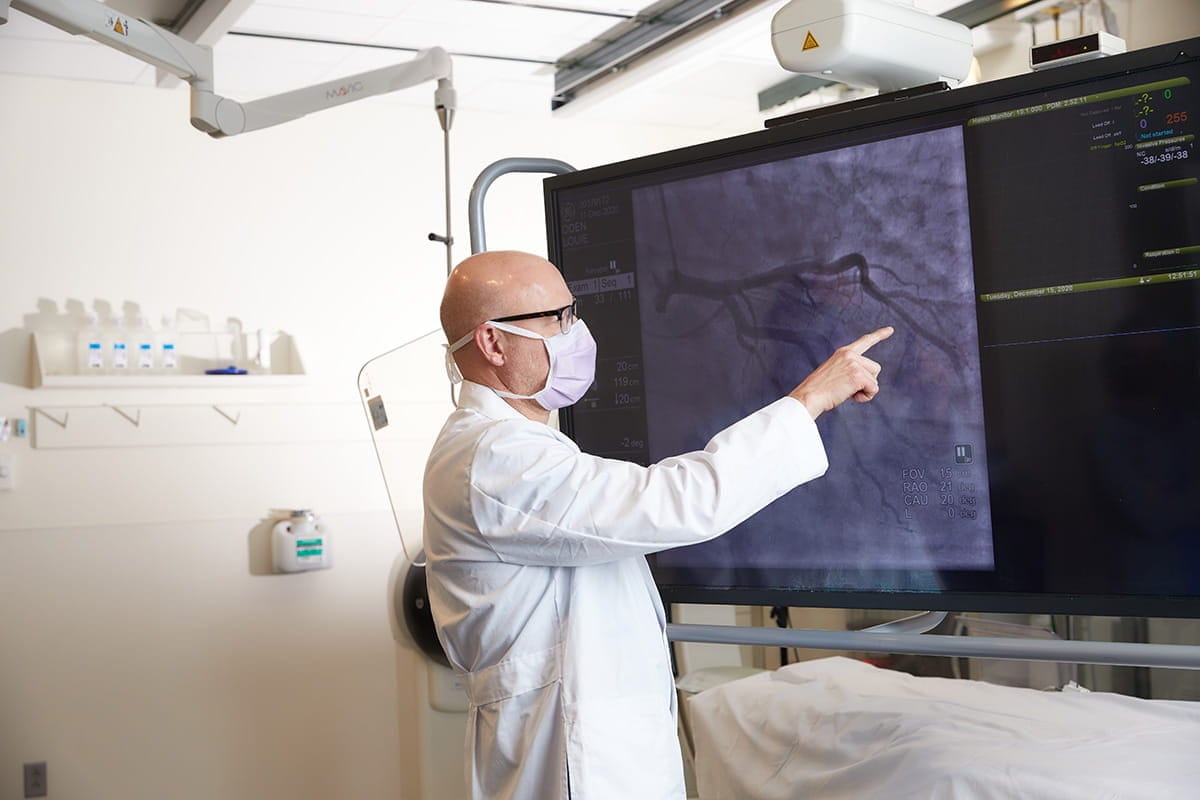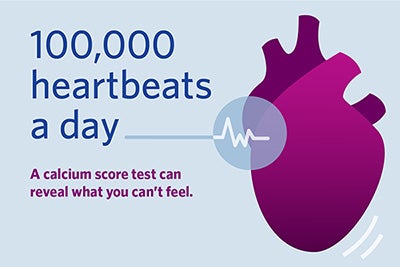Who should get a heart scan?
Your age, gender, lifestyle and medical history play a role in your heart health. You may benefit from a heart scan if you:
- Are a man or woman over age 40
- Are a smoker or have a history of smoking
- Have a family history of heart attack at an early age
- Have diabetes
- Have high blood pressure
- Have high cholesterol
*A heart scan is not for everyone. It is not recommended for routine screening of people who do not have symptoms of heart disease and have a low risk of heart attacks. Heart disease risk factors include hypertension, high cholesterol, diabetes, obesity, tobacco use, family history of heart disease. We recommend you work with your doctor on your overall health plan and any risk factors you have.
Schedule your Calcium Score Test
Calcium scoring is a diagnostic screening exam used to detect coronary artery disease (CAD) even in the absence of symptoms. By measuring the amount of calcium buildup in the arteries, this test can identify the presence of CAD and assess its severity if present.
If you are a non-pregnant woman over age 45 or a man over age 40, a referral is not required to schedule a heart scan.
Schedule at a Premier Location - Call 615-356-3999
Schedule at our AST River Park North location - Call 931-815-4485
Advanced imaging for your heart
Care teams at Ascension Saint Thomas provide advanced diagnostics and cardiac imaging, including:
- Cardiac MRI – advanced imaging technology used to diagnose heart disease.
- Cardiac PET – helps detect blockages, assess blood flow, and evaluate heart health with greater accuracy and lower radiation.
- Chest X-ray – used to diagnose chest trauma and heart-lung disease.
- CT angiography – Advanced CT imaging of the heart that can see both calcified and noncalcified atherosclerotic plaque, used in combination with the HeartFlow® test to diagnose and treat coronary artery disease.
- Echocardiography – also known as an echo test, uses ultrasound to show heart function.
Electrocardiogram (EKG) – records how your heart’s electrical system is working and creates a digital record so your doctor can quickly assess your heart during routine checkups and emergency care.
- Exercise stress test – records your heart’s activity while you walk on a treadmill.
- Event monitor – a small recording device that records your heart activity and is used as part of our cardiovascular telehealth monitoring services.
- HeartFlow® cardiac imaging – creates a 3D image of the heart and arteries to detect blood flow blockages.
- Holter – a recording device that records the electrical activity of your heart for 24 hours.
- Myocardial perfusion test – also known as a nuclear stress test, helps your doctor see how your heart muscle works at rest compared to when it’s working during exercise.
- Transesophageal echocardiogram (TEE) – uses an ultrasound probe placed in your esophagus to create images of your heart.
A doctor's referral is needed to schedule more advanced heart screenings. After your heart scan, your care team sends your results to your heart doctor.
Find a Cardiologist
Connected to a national team for heart care
When you need more advanced heart care, your doctor can connect you with the right cardiovascular specialists close to home. Your personalized heart care may include advanced surgical options. And your doctor is part of a national team of specialists, surgeons and care teams, delivering the latest in heart care testing, treatment and procedures.

 A simple heart scan can help you and your doctor better understand your heart health so that you can get the right treatment sooner. A heart scan creates high-resolution images to identify and measure calcium-containing plaque in your arteries. Too much plaque can narrow your arteries and restrict blood flow. If daily tasks or a short walk are more difficult than they used to be, ask about heart screening options.
A simple heart scan can help you and your doctor better understand your heart health so that you can get the right treatment sooner. A heart scan creates high-resolution images to identify and measure calcium-containing plaque in your arteries. Too much plaque can narrow your arteries and restrict blood flow. If daily tasks or a short walk are more difficult than they used to be, ask about heart screening options.